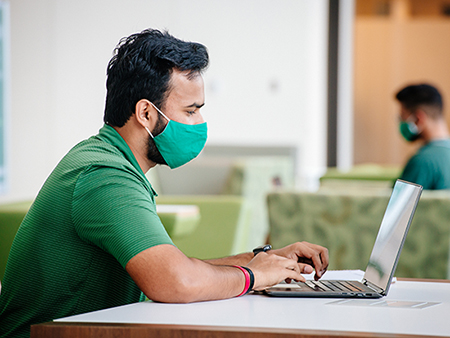 The Gulf Scholars Program prepares undergraduate students to address environmental, health, energy and infrastructure challenges in the Gulf of Mexico region.The University of Alabama at Birmingham is one of seven universities included in the National Academies’ Gulf Research Program. The $12.7 million pilot program is designed to provide scholars the background, training, education and tools to implement robust, community-oriented projects in the Gulf Coast region of the United States.
The Gulf Scholars Program prepares undergraduate students to address environmental, health, energy and infrastructure challenges in the Gulf of Mexico region.The University of Alabama at Birmingham is one of seven universities included in the National Academies’ Gulf Research Program. The $12.7 million pilot program is designed to provide scholars the background, training, education and tools to implement robust, community-oriented projects in the Gulf Coast region of the United States.
At UAB, the GSP cohort will provide select undergraduate students the opportunity to develop critical thinking and civic engagement skills with a focus on challenges facing coastal communities in the region.
Launched earlier this month, the GSP extends through 2025. During that time, up to seven additional colleges and universities will be added each year, reaching more than 25 colleges and universities in the pilot phase alone.
Each participating university will receive funds to create academic, co-curricular and extracurricular experiences related to the GRP’s core focus areas — community health and resilience, environmental protection and stewardship, and offshore energy safety. Funds are also used to provide faculty and staff support, engage evaluation specialists, and secure undergraduate research experiences.
At UAB, the Gulf Scholars Program will be housed in the Honors College. Gulf Scholars will focus their courses and senior projects on topics related to environmental protection and stewardship, health and community resilience, and other topics of special relevance to Gulf Coast communities.
Faculty from UAB’s School of Engineering and Public Health will lead the way in developing courses in these areas, hoping to expand gradually to include faculty from across the university.
“I am so excited about the Gulf Scholars Program, both because of the impact our students and graduates will make on the Gulf region and because it is the type of program UAB is perfectly suited to build,” said School of Engineering Dean Jeffrey Holmes, M.D., Ph.D. “With Engineering, Public Health, Medicine, Arts and Sciences all situated on a single campus here in Birmingham, we can tackle topics at the intersection of energy, technology, health and the environment in our courses and in projects that directly impact our region.”